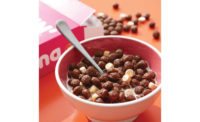ON THE NATIONAL MENU
Functional Foods and Drinks Find a Home on Restaurant Menus
Functional—to Feel Better: A growing number of consumers are familiar with basic ingredients that have a profound impact on health

Natalie’s Pineapple, Kale, Zinc & Vitamin D Juice earned a 2021 Food and Beverage Award from the National Restaurant Association. Says Natalie’s: “Find your mojo inside this nourishing blend of ingredients made to bring out the best in you. A vibrant combination of hydrating celery, paired with antioxidant – rich spinach & kale that may work wonders on your body. This blend is a natural immune boost with vitamin-c rich pineapples, zinc and vitamin D. With this ingredient list, achieving peak performance is in reach.” Photo courtesy of: Natalie’s Orchid Island Juice Company
It’s been more than a year and a half since the beginning of the pandemics and lockdowns. That is a year and a half of anxiety, uncertainty, chaos, and fear. While there may have been other periods in the modern world that were more challenging for the average consumer, for the vast majority of us this period has been challenging economically, physically and mentally.
Though immunity was top of mind during the global pandemic, the impact on our collective mental health is rapidly coming to the fore. This is particularly true for Gen Z, which was more adversely impacted by the lockdowns and accompanying isolation than any other generation. But everyone has dealt with stress if not loneliness, isolation and depression.

Veggie Superfood variety joins Mixed Berry in Smoothie King's "Immune Builder" line. Both offerings feature the company's "Immune Support Enhancer" which has 800% of guests' daily vitamin C, pluz zinc, iron and calcium, the company says. Photo courtesy of: Smoothie King Franchises Inc.
Enter functional foods focused on mental health. Functional foods have been a solid and growing trend over the past five to six years as consumers rethink the potential role food has in holistic wellbeing. While not all consumers are intimately familiar with functional ingredients, more consumers are familiar with the idea that even the most basic ingredients could have a profound impact on their health.
The beauty, from both an innovation and a strategy point of view, is that addressing mental health through ingredients and nutrients does not require exploring a vast array of completely new – and likely difficult to source given the many supply disruptions now impacting the food industry – ingredients. Many ingredients that effectively impact mental wellness are ingredients that have been on-trend for other issues for years now.
Consider, for example, plant-based foods. Most, if not all, foodservice operators and manufacturers have been exploring opportunities within the plant-based or plant-forward movement. A 2020 study in the Journal of Clinical Nutrition found that eating a healthy plant-based diet was associated with a lower risk of depression, anxiety and psychological distress in women. If a food or beverage processor is exploring opportunities in plant-based products—formulators and marketers would be wise to consider the ingredients’ associated functional benefits.
Several other ingredients that have enjoyed significant focus over the last few years are increasingly associated with functional benefits for mental wellness. Though the science backing up the claims may vary, key ingredients supporting mental health include omega-3-rich foods, walnuts, whole grains, berries, legumes, dark leafy greens, avocados and dark chocolate. A manufacturer doesn’t need to look far to find ingredients that may impart either a direct or indirect benefit that may be leveraged.
As we emerge from the pandemic, soon if not now, addressing protracted fallout from prolonged mental stress will be critical. Foods, and beverages, will play a key role for many consumers in addressing these lingering issues. Manufacturers should consider developing new products, or repositioning existing products, to help consumers find products that work for them and fit shifting eating behaviors.
Looking for a reprint of this article?
From high-res PDFs to custom plaques, order your copy today!





